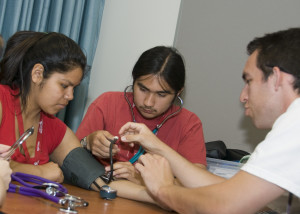 SPOKANE, Wash. – When Robbie Paul first joined Washington State University almost 20 years ago, it was the beginning of a journey that led her to a PhD, a new-found belief in herself, and a mission to inspire and empower others to pursue higher education.
SPOKANE, Wash. – When Robbie Paul first joined Washington State University almost 20 years ago, it was the beginning of a journey that led her to a PhD, a new-found belief in herself, and a mission to inspire and empower others to pursue higher education.
A member of the Nez Perce Tribe, Paul joined the WSU College of Nursing in 1995 to head up Native American recruitment and retention, including efforts to plan and organize a two-week summer camp program for Native American high school students interested in pursuing nursing careers. That program has since been expanded to cover other health science disciplines and is now known as the Na-ha-shnee Native American Health Science Institute. The 19th annual Na-ha-shnee camp will be held June 16-27 at the WSU Spokane campus.

Thirty Native American and underserved students from high schools across the Pacific Northwest and beyond will explore health science careers as they participate in the Na-ha-shnee Native American Health Science Institute and a parallel program known as “Creating a Nursing Pathway.” Students in the two programs will learn about careers in the health sciences through presentations, tours, and hands-on activities; experience life as a college student; and interact with Native American and underserved college students who serve as camp counselors.
Solving the health care provider shortage
The Na-ha-shnee Native American Health Science Institute was designed to help solve the health care provider shortage in Native American communities by sparking an interest in the health sciences in Native American high school students and helping them overcome obstacles to pursuing a college degree.
“It’s hard to develop trust when your providers are only there for a couple of years,” said Robbie Paul, director of Native American health sciences at WSU Spokane, as she talked about programs that require health care providers to spend a number of years practicing in an underserved area to get their loans repaid. “That’s why we want to train our own folks so they can come back and stay and give back to their communities.”
Paul is known throughout the Northwest and beyond for her efforts to increase the number of Native Americans entering into health science careers. To her students, however, she is known simply as “Auntie Robbie,” the woman who checks in with them, keeps them on track, and is always ready to listen and supply advice when times are tough.
Facilitating education and research
Na-ha-shnee has served more than 340 students, and Paul estimates that about 70 percent of them have gone on to college. She has helped graduate 54 Native American nurses, two pharmacists, and seven master of nursing students. Paul is currently mentoring and advising five recent Na-ha-shnee graduates who are in pre-health sciences majors at WSU Pullman and several more at other institutions. Two Native American students are in the doctor of nursing practice program. Two are pursuing a Ph.D. in nursing—a big deal, says Paul, because there are currently only 18 Ph.D. educated Native American nurses in the country.
Throughout her time at WSU, Paul has become known as the go-to person for all things related to education and research involving Native Americans. She sits on two university advisory boards that deal with issues related to educating Native Americans and conducting research to address health disparities in Native American communities. She is an investigator on multiple research grants that involve Native American communities and sits on several institutional review boards. Paul was the driving force behind WSU’s annual health careers EXPO, which helps students of all backgrounds connect with health sciences programs.
Next on her to do list is an annual conference—to be organized in partnership with the University of Washington’s Partnership for Native Health and Indigenous Wellness Research Institute—that will prepare Northwest native undergraduate students for the process of applying to graduate health sciences programs.
Defying stereotypes
Paul’s success goes to show that it takes persistence and confidence to reach your goals. A teacher told her she was a “dumb Indian” when she was a young child, and it stuck with her for a long time. She struggled to get a bachelor’s degree, and it wasn’t until she went through a divorce that Paul thought about continuing her education to provide for herself and her children. Sensing her trepidation, Paul’s father took her on a long walk and told her the creation story of the Nez Perce and how they came to be “strong, brave, and intelligent.”
Hearing her people referred to as intelligent was a turning point for Paul, who went on to earn a master’s degree in psychology from Eastern Washington University and a Ph.D. in leadership studies from Gonzaga University.
Every year during Na-ha-shnee, Paul shares the Nez Perce creation story and her own story with her students.
“I get a lot of students coming to me saying, ‘Thank you for sharing that, because I still hear that I’m a dumb Indian,'” said Paul. “And that’s sad that our children are still hearing that message.”
Related links:
Read Robbie Paul’s recent article in the American Indian Graduate, “Strong, Brave and Intelligent” (see page 40)
Source contact:
Robbie Paul, PhD, Native American Health Sciences, 509-324-7440, paul@wsu.edu